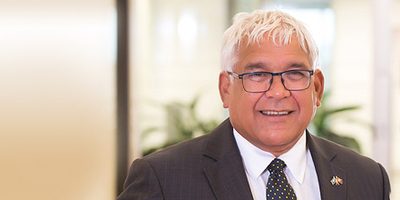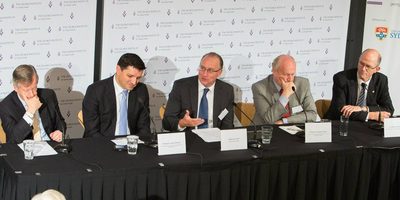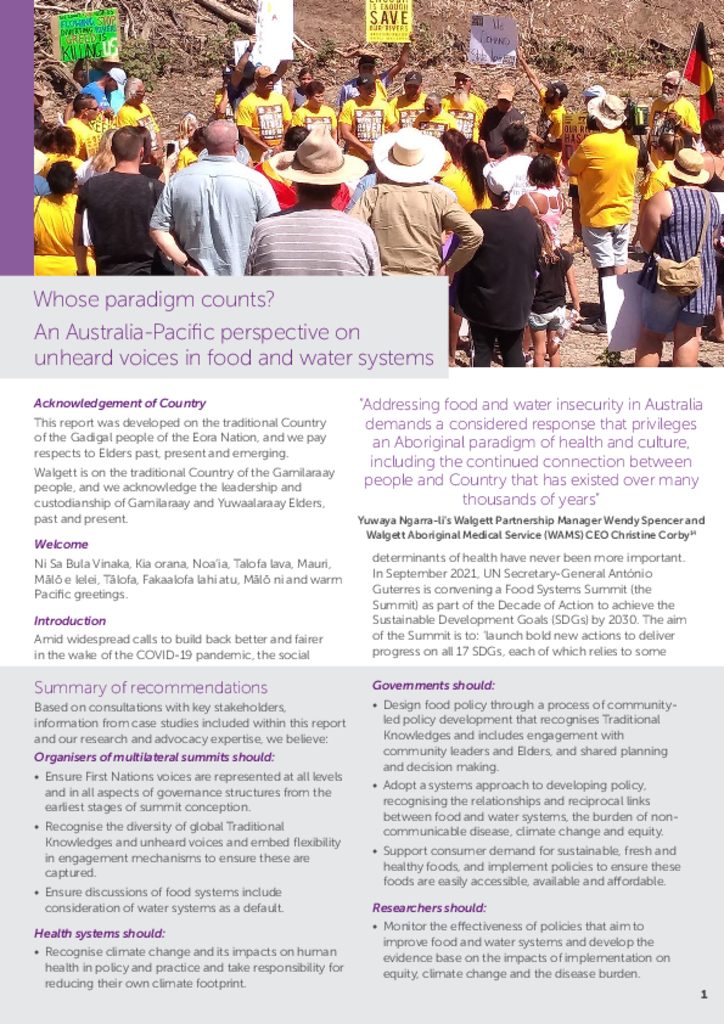
The George Institute and partners call for recognition of unheard voices at the UN Food Systems Summit
The George Institute for Global Health has partnered with the Walgett Aboriginal Medical Service and Dharriwaa Elders Group, and the Pacific Research Centre for the Prevention of Obesity and Non-Communicable Diseases, to call for Traditional Knowledges and First Nations and Pacific Island priorities to be recognised at the UN Food Systems Summit, which will be held in New York in September. The Summit aims to launch bold new actions to deliver progress on the Sustainable Development Goals, each of which relies to some degree on healthier, more sustainable and equitable food systems. It calls on people everywhere to ‘work together to transform the way the world produces, consumes and thinks about food’.
However, The George Institute’s report highlights the challenges First Nations and Pacific Island communities face in engaging with the Summit, including a lack of consideration of Traditional Knowledges or what different paradigms of health and food and water systems mean for different cultures.
“Addressing food and water insecurity in Australia demands a considered response that privileges an Aboriginal paradigm of health and culture, including the continued connection between people and Country that has existed over many thousands of years and local Aboriginal community-led solutions crying out for investment and growth,” said Wendy Spencer, Manager of the Dharriwaa Elders Group, an Aboriginal community group operating in Walgett NSW for over 20 years, and Christine Corby, OAM, the Chief Executive Officer of Walgett Aboriginal Medical Service, an Aboriginal Community Controlled Health Organisaiton (ACCHO) operating since June 1986.
'Whose paradigm counts? An Australia-Pacific perspective on unheard voices in food and water systems’ reflects community-identified challenges and priorities in Walgett NSW Australia and the Pacific Islands, and explores the health, environmental and equity impacts of food and water systems in these contexts. Two case studies were submitted with the report, which highlight specific issues around climate change preparedness, systemic racism, threatened natural resources, under-resourcing of public health priorities, the burden of non-communicable diseases (NCDs) and gender inequalities. The case studies also showcase community-led solutions to food and water insecurity in the context of the COVID-19 pandemic.
“The COVID-19 pandemic in our region has threatened our livelihood, compounded poverty, and insecurity within social and health inequities. Many villagers have now invested in social capital (solesolvevaki) through locally-driven development projects to address these issues,” said Gade Waqa, Head of Pacific Research Centre for the Prevention of Obesity and Non-Communicable Diseases, Fiji National University.
The submission to the Summit – which is part of The George Institute’s ‘Triple P’ advocacy initiative focusing on preventing NCDs, protecting the planet and promoting equity – reflects on how this and future summits can be better governed and designed to support the inclusion of Traditional Knowledges, community priorities and voices that continue to go unheard (see recommendations below).
“We need to ensure Aboriginal and Torres Strait Islander Knowledges of cultural practices and the successful management of our lands are not only acknowledged and respected, but considered by global governments. One-off consultations that do not reflect the voices of all First Nations people will fail to deliver effective solutions for real change to our food and water security,” said Dr Julieann Coombes, Research Fellow, Aboriginal & Torres Strait Islander Health Program, The George Institute for Global Health.
The UN Food Systems Summit has been criticised for its failure to meaningfully engage Indigenous and Tribal communities around the world; its links with multi-national agribusiness firms; and a lack of governance transparency. These concerns have led some civil society organisations to boycott the Summit and organise counter events, with a focus on small-scale producers and solutions such as food sovereignty and agroecology.
“The UN Food Summit should provide an important opportunity to transition towards fairer food systems,” said Jacqui Webster, Professor of Food Policy at The George Institute. “By working with communities to understand barriers and opportunities, we can support local partners to strengthen implementation of policies that improve diets. In this way we can prevent NCDs, protect the planet and promote equity.”
Report recommendations
Based on consultations with key stakeholders, information from case studies included within the report and our research and advocacy expertise, we believe:
Organisers of multilateral summits should:
• Ensure First Nations voices are represented at all levels and in all aspects of governance structures from the earliest stages of summit conception.
• Recognise the diversity of global Traditional Knowledges and unheard voices and embed flexibility in engagement mechanisms to ensure these are captured.
• Ensure discussions of food systems include consideration of water systems as a default.
Health systems should:
• Recognise climate change and its impacts on human health in policy and practice and take responsibility for reducing their own climate footprint.
Governments should:
• Design food policy through a process of community-led policy development that recognises Traditional Knowledges and includes engagement with community leaders and Elders, and shared planning and decision making.
• Adopt a systems approach to developing policy, recognising the relationships and reciprocal links between food and water systems, the burden of non-communicable disease, climate change and equity.
• Support consumer demand for sustainable, fresh and healthy foods, and implement policies to ensure these foods are easily accessible, available and affordable over the long term.
Researchers should:
• Monitor the effectiveness of policies that aim to improve food and water systems and develop the evidence base on the impacts of implementation on equity, climate change and the disease burden.









